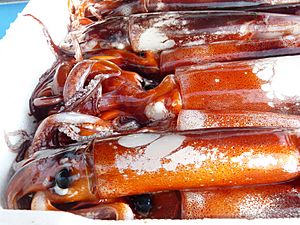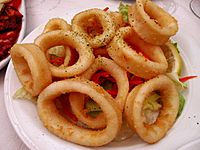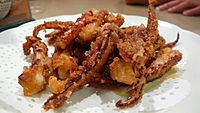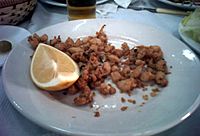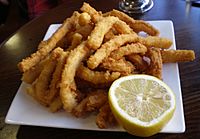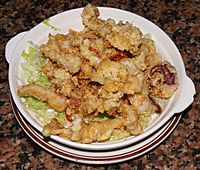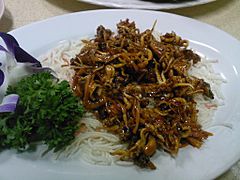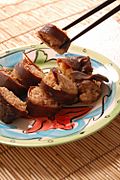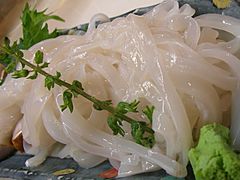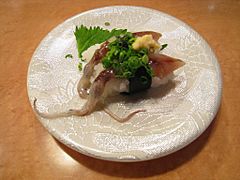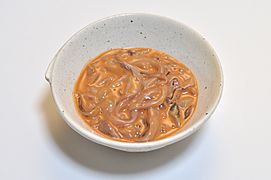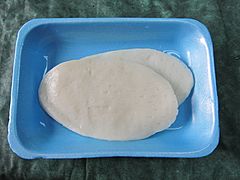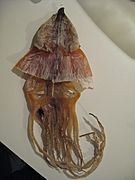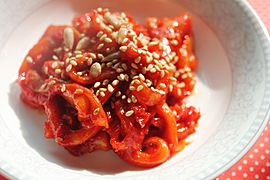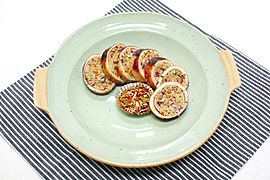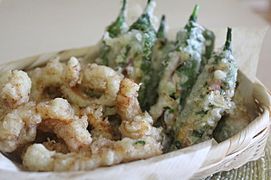Squid as food facts for kids
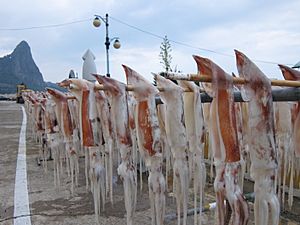
Squid is a popular food in many parts of the world. When you see it on a menu, it's often called calamari. People prepare and cook squid in many different ways. For example, fried squid is very common in countries around the Mediterranean Sea. In places like New Zealand, Australia, the United States, Canada, and South Africa, you can often buy it at fish and chip shops. In Britain, you might find it as a snack or starter in restaurants, especially fried with a Mediterranean or Asian style.
Squid can be cooked in many other ways too. In Korea, it's sometimes eaten raw. Elsewhere, it's used in dishes like sushi, sashimi, and tempura. It can also be grilled, stuffed, covered in batter, or cooked in stews and stir-fries. You might find it in rice and noodle dishes. A popular snack in some Asian countries, like China and Japan, is dried shredded squid.
Contents
How People Eat Squid
The main body of the squid, called the mantle, can be stuffed whole. It can also be cut into flat pieces or sliced into rings. The arms, tentacles, and even the ink from a squid are safe to eat. The only parts people usually don't eat are its hard beak and the clear, thin "pen" inside its body.
Squid Dishes in Asia
China
In China and other parts of Southeast Asia, squid is often added to stir-fries, rice, and noodle dishes. It can be made very spicy. In China, Thailand, and Japan, you can find whole grilled squid sold at food stalls.
Dried shredded squid or cuttlefish is a popular snack in many Asian countries, including Hong Kong, Taiwan, Korea, Japan, China, and Russia. It's often shredded to make it easier to chew.
Japan
In Japan, squid is used in almost every kind of dish. This includes sushi, sashimi (thinly sliced raw fish), and tempura (deep-fried seafood and vegetables). It can also be marinated in soy sauce, stewed, or grilled.
Korea
In Korea, some squid is served very fresh, almost immediately after it's caught. This fresh squid is called san ojingeo. It's served with sauces like Korean mustard, soy sauce, or chili sauce. People often wrap it in lettuce or perilla leaves.
Squid is also marinated in spicy pepper sauce and cooked in a pan. You can find it at food stands, either battered and deep-fried or grilled. It's also cut into small pieces and added to seafood pancakes or spicy seafood soups. Dried squid is a common snack, especially with alcoholic drinks, and is often served with peanuts. Roasted squid with hot pepper paste or mayonnaise is another popular snack. Steamed and boiled squid are also enjoyed.
In Korea, squid is also made into jeotgal, which is salted seafood. Ojingeo-jeot is made from thin strips of salted and fermented squid. It's seasoned with spicy chili powder and vegetables. This is a popular side dish served with rice. A similar dish in Japan is called ika-no-shiokara. This very salty squid, sometimes including its insides, ferments for about a month. It's kept in small jars and served in tiny amounts with white rice or drinks.
Philippines
In the Philippines, squid is cooked as adobong pusit. This dish uses squid in adobo sauce, along with its ink, which gives it a tangy flavor, especially with fresh chilies. Battered squid rings, known as calamares, are a popular deep-fried street food. They are served with sauces like alioli, mayonnaise, or chili vinegar.
Squid is also grilled over charcoal, brushed with a soy sauce marinade, and stuffed with tomato and onions. Another recipe is rellenong pusit, where squid is stuffed with chopped vegetables, squid fat, and ground pork. A type of noodle dish called pancit pusit uses squid and its ink, which gives the noodles a dark color.
South Asia
In India and Sri Lanka, people eat squid or cuttlefish in coastal areas like Kerala and Tamil Nadu. Squid is eaten deep-fried (Koonthal Fry) or as a squid gravy (koonthal varattiyathu/Roast). In these regions, squid is called koonthal, kanava, or kadamba. In Coastal Karnataka, it's also called bondaas.
Squid Dishes in the Middle East
In Egypt, Cyprus, and Turkey, squid rings and arms are coated in batter and fried. Other recipes from these areas involve simmering squid with vegetables. Squid is also often stuffed.
In Lebanon, Syria, and Turkey, fried squid is served with tarator, a sauce made with tahini. Like many seafood dishes, it might be served with a slice of lemon.
Squid Dishes in Europe
Southern Europe
Fried squid, known as calamari fritti, is a famous dish in Mediterranean cuisine. It's made by coating squid in batter and deep-frying it for a very short time (less than two minutes) to keep it tender. It's usually served simply with salt and lemon.
In Spain, battered calamari is called rabas or calamares a la romana. The squid rings are covered in a thick batter, deep-fried, and served with lemon juice and mayonnaise or garlic mayonnaise. Small, battered, and fried baby squid are called puntillitas. A dish called calamares en su tinta or chipirones en su tinta is squid stewed in its own black ink. This creates a dark, stew-like dish where the squid meat is very tender, served with a thick black sauce made from onion, tomato, and squid ink.
In Spain and Italy, squid or cuttlefish ink is used in dishes like paella, risotto, soups, and pasta.
In Spain, Italy, Greece, Cyprus, Turkey, Portugal, and Croatia, squid rings and arms are coated in batter and fried. Other recipes from these regions feature squid (or octopus) cooked slowly with vegetables like squash or tomato. When frying, the squid stays tender because it's cooked quickly. When simmering, it becomes very tender if cooked for a long time at a lower temperature. In Greece or Cyprus, it's also served with Tzatziki, a Greek yogurt, cucumber, and mint dip.
In Sardinia, squid is served with a sauce made from lemon, garlic, parsley, and olive oil.
In Portugal, lulas (squid) are commonly grilled whole. They are also used in kebabs with bell peppers and onion, or stewed. Stuffed squid, called "Lulas Recheadas," are filled with minced meat and stewed. The battered version is known as 'lulas à sevilhana'. The city of Setúbal is famous for its fried cuttlefish.
In Malta, klamar mimli is a dish where squid is stuffed with rice, breadcrumbs, parsley, garlic, and capers. It's then gently stewed in red wine.
In Slovenia, squid is eaten grilled and stuffed with pršut (a type of ham) and cheese, served with blitva (Swiss chard).
Russia
In Russia, a salad is made from lightly boiled, thinly sliced squid with onion rings, topped with mayonnaise. Another dish is squid stuffed with rice and vegetables, then roasted.
Squid Dishes in Commonwealth Countries
In South Africa, Australia, and New Zealand, fried calamari is a popular item in fish and chip shops. Sometimes, imitation calamari made from white fish is also used.
Squid Dishes in North America
In North America, fried squid is a common dish in seafood restaurants. It's often served as an appetizer, garnished with parsley or sprinkled with parmesan cheese. It comes with various dips like peppercorn mayonnaise, tzatziki, marinara sauce, tartar sauce, or cocktail sauce. In Mexico, it's served with Tabasco sauce or habanero chili sauce. Other dips like ketchup, aioli, and olive oil are also used.
What Does "Calamari" Mean?
The word calamari comes from words in Spanish, Italian, and Modern Greek. All these words eventually come from a Latin word, calamarium, which means "pen case" or "ink pot." This is because squid look a bit like old pens and they can squirt a dark, inky fluid. The Latin word itself came from a Greek word meaning "reed" or "pen."
Nutritional Value of Squid
Squid is a healthy food, similar to other fish. It has a lot of protein and phosphorus. It also has small amounts of calcium, thiamine, and riboflavin. Squid is mostly protein (about 67.5–80.7%) and has a small amount of fat (2.22–8.48%). A study in 2016 found that squid oil is a good source of healthy omega-3 and omega-6 fatty acids.
Allergies to Squid
Some people can have allergies to calamari. Like with other shellfish, the substance that causes the allergy is likely a protein called tropomyosin.
Images for kids
-
Chinese-style fried baby squid
-
Japanese Ikameshi (squid stuffed with rice)
-
Japanese Ika Sōmen (squid noodles)
-
Japanese sushi
-
Japanese Ika no shiokara (salted squid)
-
Squid jerky
-
Korean ojingeo-jeot (salted squid)
-
Korean ojingeo-sundae (stuffed squid)
See also
 In Spanish: Calamar (gastronomía) para niños
In Spanish: Calamar (gastronomía) para niños
 | Selma Burke |
 | Pauline Powell Burns |
 | Frederick J. Brown |
 | Robert Blackburn |


